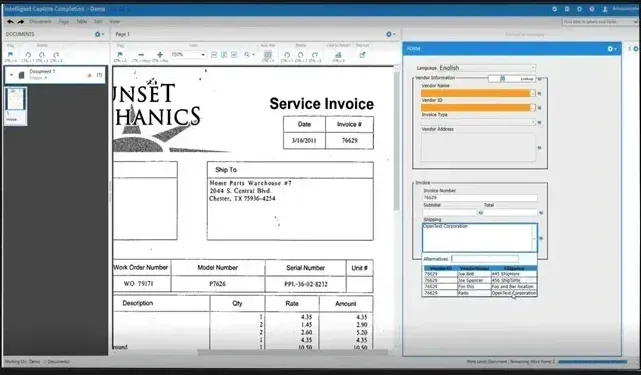Top ABBYY FlexiCapture alternatives for document processing
Explore top ABBYY FlexiCapture alternatives for efficient document processing. Compare features, pricing, and user ratings to find the best fit for your needs.


ABBYY is a technology company making document processing software since 1989. Their product lineup includes FineReader PDF for OCR and PDF management, FlexiCapture for enterprise document capture, ABBYY Vantage for intelligent document processing, Timeline for process intelligence, and Mobile Capture for mobile document scanning.
This comparison primarily focuses on alternatives to ABBYY FlexiCapture. It offers several powerful capabilities:
- Advanced document recognition that works with both printed and handwritten text
- Automatic document classification and data extraction
- Built-in verification to ensure accuracy
- Integration with business systems like ERP and accounting software
While FlexiCapture's pricing isn't public (you'll need to contact ABBYY for a custom quote), we know from our research and customer feedback that it's positioned as an enterprise solution.
Businesses often look for FlexiCapture alternatives due to:
- Initial setup may require significant technical expertise and training
- Need for more flexible deployment options
- High per-page processing costs and budget constraints
- Requirements for specific industry or use case features
- Desire for simpler implementation and maintenance
- Complex documents often need more manual verification than expected
That's why we've created this comprehensive guide comparing the top alternatives to ABBYY FlexiCapture. We'll examine each option's features, pricing, and ideal use cases to help you find the right document processing solution for your needs.
A quick comparison of ABBYY FlexiCapture alternatives
| Tool | Core Technology | Deployment | Pricing | Best For | Key Advantage over FlexiCapture | G2 Rating (out of 5) |
|---|---|---|---|---|---|---|
| ABBYY FlexiCapture | Content IQ, ML | Cloud, On-premise | Enterprise, custom quote | Enterprise, high-volume | (Baseline) | 4.1 |
| Nanonets | Deep Learning, OCR | Cloud | Freemium, pay-as-you-go | SMB to Enterprise | Faster setup, easier integration, continuous learning | 4.8 |
| OpenText | AI, ML | Cloud, On-premise | Enterprise, custom quote | Enterprise, compliance | Flexible deployment, OpenText ecosystem | 4.4 |
| DocParser | Zonal OCR, Templates | Cloud | Freemium, subscription | SMB, structured docs | Simpler setup, lower cost for fixed layouts | 4.6 |
| Tungsten Capture | OCR, Batch Processing | On-premise, Cloud | Enterprise, custom quote | Enterprise, high-volume | Stronger batch processing, image preprocessing | 4.3 |
| Rossum | Cognitive AI | Cloud | Enterprise, custom quote | Mid-market to Enterprise | Template-free approach, faster implementation | 4.4 |
| Klippa | OCR, Workflows | Cloud | Custom, subscription | SMB to Mid-market | Fast setup, visual workflow builder, real-time processing | 4.7 |
| Hyperscience | ML, Automation | Cloud | Enterprise, custom quote | Enterprise, back-office | Higher automation rates, built-in QA | 4.6 |
| SS&C Blue Prism | RPA, IDP | Cloud, On-premise | Enterprise, custom quote | Enterprise, automation | End-to-end process automation, legacy integration | 4.5 |
| DocuWare | Document Management, Workflow | Cloud, On-premise | Enterprise, custom quote | Mid-market to Enterprise | Complete document lifecycle management, e-forms | 4.4 |
Now, let’s explore each alternative in detail.
1. Nanonets
Nanonets is a modern, AI-powered document processing platform that helps businesses automate data extraction from any type of document. The platform combines advanced OCR with deep learning to handle both simple forms and complex unstructured documents.
1. Pre-trained models for invoices, receipts, and POs that deliver 95%+ accuracy out of the box
2. AI-powered document classification that automatically routes documents to correct workflows
3. Smart data capture that learns from every correction to improve accuracy over time
4. Built-in approval workflows with custom validation rules and automatic routing
5. Automated data formatting and post-processing to ensure clean, standardized output
6. Real-time integrations with accounting systems like QuickBooks, Xero, and ERPs
7. Multi-channel document intake through email, cloud storage, or API
8. Support for 40+ languages with specialized handling for right-to-left scripts
Pricing: Offers a free trial with up to 500 pages. After that, it will cost $0.3 per page. Pro plans are available with custom pricing and features. Get in touch with our team to learn more.
| Pros of Nanonets | Cons of Nanonets |
|---|---|
| Quick setup with pre-trained models | Higher per-page costs for lower volumes |
| Zero-shot AI for immediate data extraction | Limited offline capabilities |
| Continuous model improvement through machine learning | Some UI/UX improvements needed |
| Modern API and direct integrations with cloud software | |
| Responsive customer support | |
| Handles complex, unstructured documents reliably | |
| Advanced table and line item recognition | |
Best suited for: Mid-market companies and large enterprises across the finance, healthcare, logistics, and manufacturing sectors. Trusted by 34% of Fortune 500 companies, it is ideal for companies with complex document processing needs, where you can effectively handle structured and unstructured documents across multiple languages.
2. OpenText Intelligent Capture

OpenText Intelligent Capture (formerly Captiva) is part of an enterprise-grade information management solution that helps companies extract, govern, and share information. The Intelligent Capture module automatically recognizes and processes incoming content while continuously learning from user corrections to improve accuracy over time.
1. Omni-channel capture — email, scanned documents, and digital content
2. AI-powered classification and data extraction with continuous learning
3. Built-in validation interface for human-in-the-loop verification
4. Automated metadata tagging and document routing
5. Integration with leading cloud platforms (AWS, Azure, Google Cloud)
6. Flexible deployment options (cloud, private cloud, or on-premises)
Pricing: Enterprise licensing model with custom pricing based on deployment options and volume. No free trial is available.
| Pros of OpenText Intelligent Capture | Cons of OpenText Intelligent Capture |
|---|---|
| Strong enterprise system integration capabilities | Complex deployment requiring technical expertise |
| Excellent recognition accuracy for structured documents | Higher implementation and training costs |
| Flexible deployment options (cloud/on-premise) | Steep learning curve for administrators |
| Robust security and compliance features | Complex licensing model |
| Continuous learning from user corrections | Support response times could be improved |
| Scales well for high-volume processing | |
| Strong cloud platform support |
Best suited for: Large enterprises and government organizations handling high volumes of documents that require strict compliance and security measures. Particularly valuable for organizations with complex integration needs and existing OpenText infrastructure.
3. Docparser

Docparser is a specialized document data extraction platform focusing on document processing with consistent layouts. Using zonal OCR and AI, it helps businesses automate data extraction from PDFs, Word documents, and images without requiring coding experience.
Read About: Docparser Alternatives and Competitors
1. AI-powered document identification and routing to parsing rules
2. Custom parsing rules with a visual template builder
3. Zonal OCR for precise data location and extraction
4. Advanced table extraction for embedded data
5. Pre-built templates for common document types
6. Multi-channel document import (email, cloud storage, API)
7. Real-time data validation and formatting
8. Integration with business tools through Zapier and Make
Pricing: Entry-level plan starts at $39 per month, allowing you to process up to 100 pages. After that, you've the Pro plan at $74 monthly for 250 pages and Business plan at $159 per month for up to 1,000 pages. Enterprise customers can get custom pricing tailored to their needs. Free trial is also available.
| Pros of DocParser | Cons of DocParser |
|---|---|
| Excellent at handling documents with fixed layouts | Limited capabilities for unstructured documents |
| Strong table extraction capabilities | Requires separate template for each document format |
| Visual template builder for easy setup | Learning curve for complex parsing rules |
| Affordable entry pricing | Not ideal for bulk processing with varied layouts |
| Quick implementation time | Limited language support |
| Extensive integration options | |
| Responsive customer support |
Best suited for: Small to mid-sized organizations that regularly process structured documents with consistent layouts, particularly in finance, logistics, and retail sectors. Ideal for companies processing documents that follow standardized formats.
4. Tungsten Capture

Tungsten Capture (formerly Kofax Capture) is an enterprise document processing solution that combines OCR technology with intelligent data extraction capabilities. The platform focuses on high-volume document processing with strong batch-processing capabilities.
Read About: Tungsten Automation Alternative
1. Advanced OCR with intelligent recognition technology
2. Multi-channel document capture (scanners, email, fax)
3. Automated document classification and separation
4. Built-in image enhancement and cleanup
5. Extensive validation rules and quality control
6. Integration with major ERP and ECM systems
7. Batch processing optimization
8. Mobile capture capabilities
Pricing: Enterprise licensing model with pricing based on modules, volume, and deployment options. Contact Tungsten for custom quotes. No free trial is available.
| Pros of Tungsten Capture | Cons of Tungsten Capture |
|---|---|
| Strong batch processing capabilities | Complex setup and configuration |
| Excellent image preprocessing | Steep learning curve |
| Reliable OCR accuracy | Outdated user interface |
| Good integration options | Limited cloud capabilities |
| Robust validation rules | Complex licensing model |
| Strong enterprise security | Documentation needs improvement |
| Mobile scanning support | Support response times vary |
Best suited for: Large organizations handling high volumes of structured documents, particularly in healthcare, finance, and government sectors. Ideal for companies with established IT infrastructure who need robust batch processing capabilities and strong integration with legacy systems.
5. Rossum

Rossum takes a fundamentally different approach to document processing compared to FlexiCapture. Instead of relying on templates and rules, it uses cognitive AI to understand documents naturally, similar to how a human would read them. This makes it particularly appealing for organizations dealing with varying document formats and layouts.
1. Cognitive data capture that eliminates template creation
2. AI-powered validation with high-accuracy out of the box
3. Two-way communication system for handling exceptions
4. Native integration with major ERP and accounting systems
5. Automated document routing and classification
6. Real-time collaboration for distributed teams
7. Developer-friendly API with extensive documentation
8. Support for complex document types including invoices, POs, and receipts
Pricing: Custom enterprise pricing based on document volume and features. Contact Rossum for detailed quotes.
| Pros of Rossum | Cons of Rossum |
|---|---|
| Zero template maintenance required | Processing delays with large documents |
| Quick implementation timeframe | Higher costs for low volumes |
| Excellent accuracy for standard documents | Occasional system outages |
| Responsive customer support | Complex tax handling for some regions |
| Modern, intuitive interface | Learning curve for advanced features |
| Regular feature updates | Limited Excel document support |
| Strong API capabilities |
Best Suited For: Organizations processing over 10,000 documents monthly who want to avoid the overhead of template management. Ideal for companies with diverse document formats or those looking to modernize their document processing workflow.
6. Klippa DocHorizon

Klippa DocHorizon helps businesses automate document processing through an intelligent platform that combines OCR with AI-powered data extraction. It lets you create custom document workflows in minutes through its no-code interface.
Read About: Klippa Alternatives and Competitors






























.png)





















![‘Companion’ Ending Breakdown: Director Drew Hancock Tells All About the Film’s Showdown and Potential Sequel: ‘That’s the Future I Want for [Spoiler]’](https://variety.com/wp-content/uploads/2025/02/MCDCOMP_WB028.jpg?#)
























